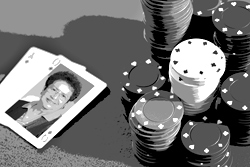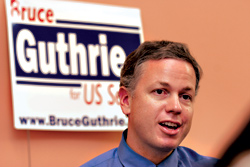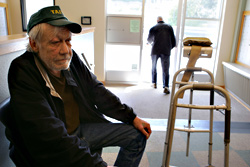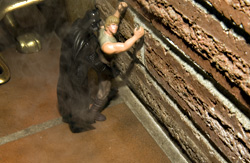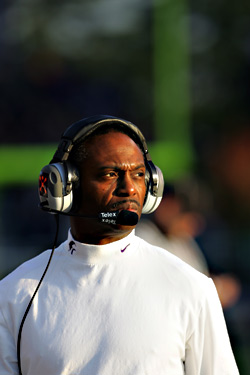“I feel like I’ve just watched mass hysteria.” So says state Sen. Margarita Prentice, D-Renton, of the heated reaction to her brainchild, the state’s new ban on online gambling complete with felony sentences for violators—including Web site hosts who merely point readers to gambling Web sites. “And remember, I am a nurse,” she says.
The Sturm und Drang to which the retired nurse refers is heated media coverage of the ban, nationally and locally. It is driven as much by the mainstream popularity of online poker as it is outrage over Washington state limiting free speech and fears that authorities may go after penny-ante poker players gambling from their living room couches. As a result, two national magazines have canceled their Washington subscriptions, a local Web site for poker buffs has shut down, and there are legitimate concerns in the media that just mentioning online poker sites in an article could bring the law down on a newspaper. Prentice and the Washington State Gambling Commission both claim that what we’ve got here is a proverbial tempest in a teapot, an innocent law being blown out of proportion. Poker players see it differently—that they’ve been turned into the legal equivalent of child abusers and thieves.
But what’s flown under the radar in the maelstrom is how much money Prentice has received in recent years from tribal gaming interests—with their billion- dollar brick-and-mortar casinos—and that the gambling commission is now actively investigating several gaming Web sites based in Washington.
Prentice, first elected to the House in 1988, has been in the Senate since 1993 and is chair of the powerful Senate Ways & Means Committee and a longtime member of the gambling commission, which regulates all legal wagering in the state. That gives her wide influence over state spending and budgets as well as much power in shaping the state’s $1.7 billion a year gambling industry in legal tribal casinos, card rooms, horse tracks, and the state lottery.
Last November, a full three years before her expected re-election bid, Prentice received $2,700 from David Barnett and his wife, Christine. Barnett is tribal chair of the Cowlitz tribe, an Indian nation that is slated to construct a new casino in La Center, which would easily cater to the casino-free Portland market. Prentice also got another $1,175 from the Washington Indian Gaming Commission, a lobbying group, and two lobbyists who represent Indian interests. Combined, the two sets of contributions are about 20 percent of the $22,000 she has raised so far for her 2008 race. Within four months of Prentice receiving those contributions, her online gambling ban bill raced through both houses of the Legislature with little opposition and no press attention.
In 2004, Prentice got almost $9,000 from gambling interests.
Is there a connection between her legislation and protecting Indian casinos, which she oversees, from online competition?
Prentice says no. “I figure it’s minuscule, frankly,” she says, referring to her tribal campaign contributions. “I consider it not particularly impressive, considering that there are 29 tribes in the state.
“I am surprised I am continuing to be regarded as the defender of the tribes,” she says. Prentice argues that the online gambling ban doesn’t help tribal casinos in the least—that it actually hurts them. “If online gambling were legal, it would multiply what the tribes could do by 1,000.”
In 2005, tribal casinos in Washington had $1 billion in revenues, according to the state’s gambling commission. Prentice says Indian tribes would dominate an online market for legalized gaming.
But national online gaming experts disagree. They say Prentice is clearly helping Indian gaming interests.
“I don’t buy it,” says Mark Balestra, editor of Interactive Gaming News. “The only scenario in which legalization would be good for Indian gaming interests is one in which they are allowed to operate online casinos but other U.S. gaming interests [giants such as Harrah’s, MGM, and Mirage] are not. No such policy was brought to the table. She is either misguided or full of it.”
Balestra and other gaming experts say that if online gambling were legal in the United States, it would be highly unlikely that Indian-owned sites would dominate the market, given how much money and resources are held by the big Las Vegas and Atlantic City gambling interests. Last week, the U.S. House passed a federal ban on online gambling. The bill now goes to the U.S. Senate.
Pokerpulse.com, which monitors online gambling activity, estimates that last December 100,000 players wagered online each day. The online gambling industry—fueled by sites in countries like Antigua, where the activity is legal—is estimated to be worth about $12 billion a year. An estimated 2 million people gamble online.
But whoever the new state law (and federal law) helps, it certainly hurts recreational gamblers.
“This law is going to push online gambling underground, but it won’t stamp it out,” says Radley Balko, a policy analyst at the Cato Institute, a libertarian think tank in Washington, D.C. He says the law will make online poker players a better target for “nefarious elements.”
The state’s gambling commission insists that it won’t target individual gamblers under the new state law, says spokeswoman Susan Arland. The commission’s intent, she says, is to go after the big offshore gambling sites. But the law doesn’t preclude the state from going after people playing for small stakes online. They could be subject to felony charges and face up to five years in prison.
What’s more, Arland says that the gambling commission is already putting the law to work.
“We have investigations ongoing involving gambling sites in this state,” she says. Arland declined to identify whether these were actual gambling sites or more pedestrian poker strategy sites, where players offer one another tips, citing the continuing investigation. There are no known gambling Web sites operating in Washington, according to gaming experts. It’s possible that the state could be looking into the operations of the fan Web sites and blogs under the law’s provision that makes it illegal for anyone to aid and abet online gaming. So far, that includes something as benign as a newspaper mentioning sites such as www.pocketfives.com (a gambling Web site) to advertising on fan sites for online poker sites.
Already, Casino Player and Strictly Slots, two gambling magazines concerned about running afoul of the ban, have canceled subscriptions in Washington. Officials at the magazines were not available for comment. But gambling advocates are seething on their behalf, especially over Prentice’s and the gambling commission’s claim that although the law calls for up to five years in prison for an offense, most sentences would be one year in a county jail.
“How would [Prentice] feel about spending a year in jail for playing poker online?” says Michael Bolcerek, president of the Washington, D.C.–based Poker Players Alliance. He points out that a felony conviction, even with a lenient sentence, makes it difficult to get a job and that someone could easily lose their home while in jail—practical penalties he considers grossly out of line. He says some of his 30,000 members nationally are mulling legal or electoral challenges to the Washington ban.
One puzzling aspect of the law is that the problems it was designed to prevent aren’t entirely clear. Neither Prentice nor the gambling commission could cite examples of Washingtonians who have spent their children’s inheritance in online poker tournaments, for example. Both parties say that the law came into being simply to make Washington law dovetail with forthcoming federal laws outlawing online gambling. Prentice also says it was to preclude the Washington State Lottery from offering online games.
But the reaction of many nongambling citizens has been to see the law as yet another example of Washington putting on nanny-state airs. “I don’t mind being held up to ridicule like I am trying to be everyone’s mother,” says Prentice. When the Legislature reconvenes in January 2007, she plans to introduce legislation codifying how close card rooms can be to schools.
